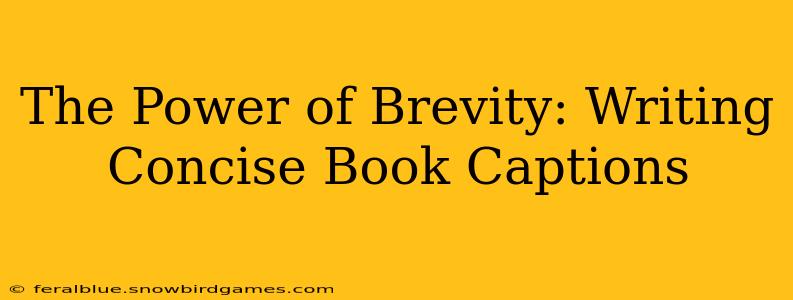In the crowded marketplace of ideas, your book caption is your first—and often only—chance to grab a reader's attention. A compelling, concise caption can be the difference between a book gathering dust and becoming a bestseller. This isn't about cramming keywords; it's about crafting a powerful, memorable message that encapsulates the essence of your work. Let's explore the art of writing concise book captions that truly sell.
What Makes a Book Caption Effective?
An effective book caption is more than just a summary; it's a persuasive marketing tool. It needs to:
- Be Concise: Keep it short and sweet. Think Twitter-length, aiming for under 100 characters if possible for online platforms.
- Highlight the Core Benefit: What problem does your book solve? What unique value does it offer the reader? Focus on the why someone should read it.
- Evoke Emotion: Tap into the reader's desires, fears, or aspirations. A caption that connects emotionally is far more likely to resonate.
- Include Keywords: While brevity is key, strategically incorporating relevant keywords can improve search engine optimization (SEO).
- Be Memorable: A catchy, well-crafted caption sticks in the reader's mind long after they've seen it.
How to Write a Killer Concise Book Caption
Here's a step-by-step guide to crafting a winning book caption:
-
Understand Your Target Audience: Who are you writing for? What are their needs and desires? Tailor your caption to speak directly to them.
-
Identify Your Book's Core Message: What's the single most important takeaway your readers should gain? Distill this message into a few powerful words.
-
Brainstorm Keywords: What terms would someone search for to find a book like yours? Naturally integrate these into your caption.
-
Experiment with Different Approaches: Try various phrasing, tones, and styles. See what feels most authentic and impactful.
-
Test and Refine: Once you have a few options, test them out. See which one performs best in terms of clicks and engagement.
Common Mistakes to Avoid
- Being Too Vague: Avoid generic descriptions that don't tell the reader anything specific about your book.
- Overusing Jargon: Keep it simple and accessible to a broad audience.
- Neglecting SEO: While brevity is crucial, don't completely ignore the importance of keywords for online visibility.
- Forgetting the Call to Action (CTA): Subtly encourage readers to learn more or purchase the book.
Examples of Concise and Effective Book Captions
- "The ultimate guide to mastering [skill]. Unlock your potential today!" (Focuses on benefits and includes a CTA)
- "A gripping tale of [genre] that will keep you on the edge of your seat." (Highlights genre and evokes emotion)
- "[Problem] solved. Discover the secrets to [solution]." (Clearly states the problem and solution)
Frequently Asked Questions (FAQs)
How long should a book caption be?
Ideally, your book caption should be as concise as possible, aiming for under 100 characters where space is limited, like on social media platforms. However, the ideal length might vary depending on the platform and context.
What if my book has multiple themes?
Focus on the most compelling and marketable theme. You can always highlight other aspects in your book description or marketing materials.
How can I make my caption more memorable?
Use strong verbs, evocative language, and a unique selling proposition that sets your book apart from the competition.
Should I include the author's name in the caption?
While not always necessary, including the author's name can be beneficial if they have a strong brand presence.
By mastering the art of brevity, you can craft book captions that not only grab attention but also effectively communicate the value of your work, ultimately leading to increased sales and a wider readership. Remember, a concise and compelling caption is the cornerstone of successful book marketing.

